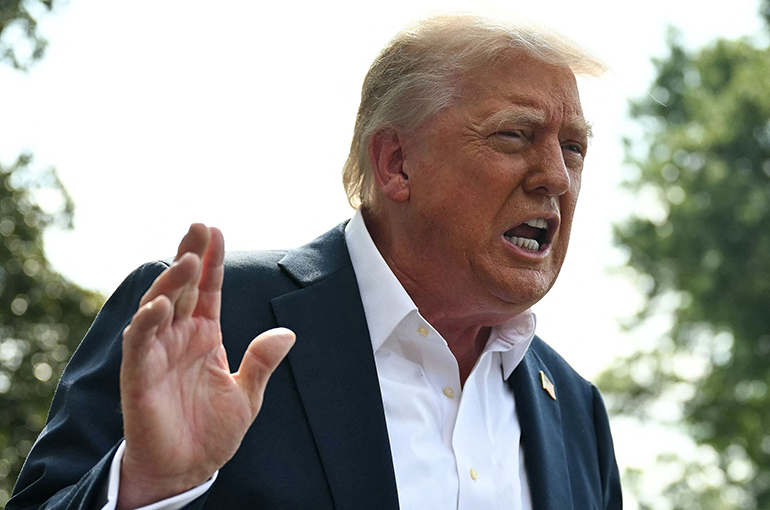 Trump Takes Tariffs as Poker Game Rather Than Trade War, US Financial Historian Says
Trump Takes Tariffs as Poker Game Rather Than Trade War, US Financial Historian Says(Yicai) Aug.4 -- The recent tariffs imposed by Donald Trump on the rest of the world are more like a poker game played by the US president to accomplish his goals, rather than a war that will impede trade between countries, according to John Steele Gordon, an acclaimed US historian and author specializing in business and finance.
Trump uses this game to enact his policies to improve global trade, Gordon, who wrote The Great Game: The Emergence of Wall Street as a World Power, among other books, said in a recent interview with Yicai. Trump is not just being an imperialist, but believes the trading system is very unfair, he added.
Gordon also mentioned that the stock markets reflect human nature, and the difference between the US and China’s stock markets may attribute to the different ways of people’s thinking.
Excerpts from the interview are below:
Yicai: Trump previously recommended a 50 percent tariff on all imports from the European Union. In an interview in March, you said that Trump's goal was not to protect the US industry, but to promote fair competition. Do you still stand by this?
John Steele Gordon: Donald Trump is using tariffs in a way that nobody has used them before. He doesn't want a 50 percent tariff on European goods. That's simply he's playing poker, he's putting these chips out there and threatening you with tariffs unless you do something.
Fair trade helps everybody, and tariffs impede trade. So the United States, like every other great power, needs to ensure manufacturing capacities in certain respects.
Yicai: So why does Trump want to play this game? What's his intention?
JSG: Because that's the way he thinks he can get his policies enacted for the betterment of all world trade. He's not just being an imperialist here, he thinks the current trading system is very unfair. And it is. Why should the US pay higher tariffs than foreign countries pay?
Trump is playing a game, he's a negotiator, and he loves to. He wrote a book that sold millions of copies called Trump: The Art of the Deal, and that's what he's doing right now.
Yicai: If he keeps playing this game, could the tariff war's impact on the US be underestimated?
JSG: It's too soon to know what's going to happen here. This has only been going on since early April, when he announced what he called 'Liberation Day'. So we're in the early stages of this. By the end of summer, we'll have a much clearer idea of how things are working out.
And I wouldn't call it a tariff war, at least it isn't yet. The other countries want to trade with the US as much as we want to trade with them. So there will be a new, more level playing field by the end of summer.
Yicai: We can find the US stock market tends to have longer bull markets and shorter bear markets, so in your opinion, why?
JSG: It goes back once again to human nature. And therefore, bull markets tend to run because the people want to believe the stock market is going to go up. And once enough people believe it, then the stock marketing becomes true.
So the bull market runs on until something comes in that changes everything, and then suddenly you have a bear market. People realize that the market has gone too far in upward direction, and there is a sudden correction. But then again, humans’ basic optimism comes into play, and so the bear market tends to end rather soon.
Yicai: The Chinese stock market tends to have shorter bull markets, but longer bear markets.
JSG: Well, I think Americans tend to be probably the most optimistic people in the world. We’re young and young people tend to be optimistic and young countries tend to be optimistic. The longer your history, the longer you might have a chance to see it.
Stock markets are human behavior, and as I say, Americans are optimistic people and we have reason to be. Remember 250 years ago, we went from a little string of colonists of no importance to the strongest country in the world.
China has a different view of history. The Chinese dynasty history is of moving in cycles. In the days of the Chinese Empire, the new dynasty would be formed, prosper and then it would lose the mandate of heaven.
In western civilization, especially in America, we tend to see things as moving upward and on a constant basis. Now they go dips, but it’s not a cycle, it’s a continuing climb over the long term. Maybe that kind of thinking is what determine how long bull markets and beer markets land.
Editors: Dou Shicong, Martin Kadiev